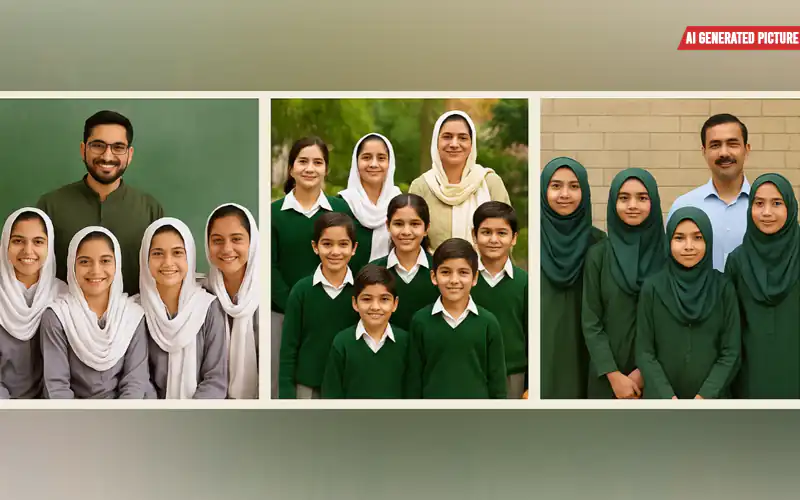Three Pakistani schools named finalists for the World’s Best School Prizes 2025, recognizing outstanding efforts in education and community impact globally.
Organized by UK-based T4 Education, the prestigious awards celebrate schools that are transforming lives through innovation, collaboration, resilience, and healthy practices across five major categories.
Sanjan Nagar Public Education Trust Higher Secondary School in Lahore earned a Top 10 spot in the “Overcoming Adversity” category for empowering underprivileged children through inclusive, inquiry-based IB and PYP curriculum.
Located in Glaxo Town, Lahore, the charity school uses a sustainable model to equip marginalized students with vital 21st-century skills, encouraging critical thinking and long-term community upliftment.
In Balochistan, Beaconhouse College Programme’s Juniper Campus in Quetta was shortlisted for “Community Collaboration” for its student-led mobile science lab, Science Gaari, bringing STEM education to rural and underserved children.
Science Gaari allows real-world, interactive learning outside the classroom, helping students in remote areas access modern scientific knowledge through a unique, low-cost, and locally driven solution.
Nordic International School Lahore secured its place in the same category by engaging parents in students’ academic journeys and creating a nurturing, kindness-driven learning environment that promotes happiness and success.
All three schools are now eligible for the Community Choice Award, which will be decided through a global public vote, while five category winners will be selected by an expert judging panel.
Winners of the 2025 World’s Best School Prizes will be announced in October, followed by the World Schools Summit in Abu Dhabi on November 15–16, where all finalists will be honored.
Vikas Pota, Founder of T4 Education and the World’s Best School Prizes, said:
T4 founder Vikas Pota praised the finalists, saying these schools offer hope amid global uncertainty, climate challenges, and rapid AI-led changes by placing human values at the heart of education.
About the schools:
Located in the heart of an industrial hub in Lahore, Sanjan Nagar Public Education Trust Higher Secondary School stands as a pioneering institution championing equitable education for marginalized communities. Originally established in an abandoned factory with only 10 students and a few volunteer educators, it has evolved into a vibrant school serving around 800 students today.
As the first school in Pakistan to implement the International Baccalaureate (IB) Primary Years Programme (PYP) for underserved populations, Sanjan Nagar has redefined quality education by adopting an inclusive, inquiry-driven curriculum. This model promotes critical thinking, emotional intelligence, and global awareness, aligning with the UN Sustainable Development Goals (SDGs). Students regularly engage in community projects, local exhibitions, and collaborative international initiatives, equipping them with the skills needed for active citizenship and academic excellence.
Initially, introducing the IB-PYP approach was met with resistance from both teachers and parents. However, its success has transformed perspectives, with graduates now securing international scholarships, including 14 who studied in the U.S. on full-year scholarships and many who are pursuing postgraduate degrees abroad. Additionally, seven teachers have attended professional development programs in the United States, enhancing teaching quality.
With approximately 65% of its students from the Christian community, the school fosters a culture of interfaith respect where all religious celebrations are shared inclusively. This commitment to harmony and inclusivity has helped uplift entire families, with many breaking the cycle of poverty due to the career success of alumni. Through an educational philosophy centered on empowerment and lifelong learning, Sanjan Nagar is driving social change in one of Pakistan’s most economically challenged regions.
In the underserved province of Balochistan, Beaconhouse College Programme (BCP) Juniper Campus in Quetta is breaking barriers to science education through an innovative project known as Science Gaari—a mobile, student-led science lab that travels to remote schools across the region. With Balochistan facing one of the highest rates of out-of-school children in the country, the initiative addresses critical education gaps by delivering hands-on, real-world science experiences to students who have had limited or no exposure to laboratory equipment.
Science Gaari, created in collaboration with UNICEF, is driven by student volunteers who receive training from science teachers to lead experiments and demonstrations. These students act as science ambassadors, sparking curiosity and passion for STEM among their rural peers. The school’s leadership oversees coordination, logistics, and outreach to ensure smooth operations.
So far, the mobile lab has reached over 150 underserved schools, increasing student engagement in science by 35% and improving test results by 20%. The project has not only inspired students to consider STEM careers but has also empowered rural teachers by equipping them with innovative teaching resources. For the BCP Juniper Campus students involved, the experience has fostered leadership, communication, and mentoring skills, enabling them to become community changemakers.
By supporting student-led innovation and providing practical science education to the most isolated communities, BCP Juniper Campus has shown that educational inclusion is possible, even in the most challenging contexts.
Nordic International School in Lahore is redefining the educational experience through two foundational principles: parental involvement and a culture of kindness. The school, which has grown from five students to over 300, encourages family engagement throughout a child’s academic journey, with research highlighting that such collaboration contributes significantly to student success.
From day one, parents are connected via the school’s digital platforms, where they can track classroom activities and understand the educational intentions behind them. Regular workshops help parents strengthen relationships with their children and better support their learning. The school also hosts “Exit Points” at the conclusion of each unit in preschool and primary grades, where students present their projects, providing parents an opportunity to witness their children’s progress firsthand.
What sets Nordic apart is its deliberate emphasis on empathy and wellbeing. A kindness-focused initiative is embedded across all grade levels, fostering an inclusive and supportive school environment. This effort has paid off, with the school achieving an annual satisfaction rating of 4.5 out of 5.
Principal Kamil Majeed has shared the school’s unique approach through platforms such as TEDx, where he speaks about “Leading with Kindness,” and via social media, showcasing everyday acts of kindness that define the school culture. By fostering parental engagement and nurturing emotional wellbeing, Nordic International School ensures students feel safe, valued, and empowered to discover and pursue their passions.










